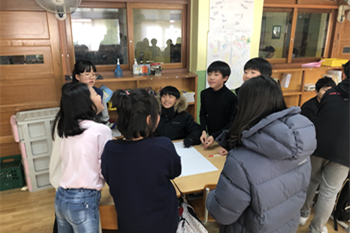
In 2016, a group of elementary school teachers got together for a regular reading session. Through discussions, they acknowledged gender stereotypes and seeked ways to fight against them. To take steps in changing gender stereotypes, they created Outbox, a gender education research association providing classes for elementary students, in 2017.
Outbox works to enhance student gender sensitivity by providing gender equality classes and sex education. According to Hwang Go-woon, a member of Outbox, many gender stereotypes are already instilled in children as young as elementary students.
“When we ask students to line up in two rows, they naturally split up into a row for girls and the other for boys, though we never asked them to split up that way,” Hwang said. “Also, when girls say they want to become police officers, students asked ‘How can a girl become a police officer?’”
Hwang further commented that such stereotypes are also common among teachers. For example, teachers would make biased judgements on male or female teachers. They also regularly heard comments from teachers suggesting boys are stronger than girls.
These existing biases on being womanlike or manlike are some of the basic issues that Outbox tackles. However, in the beginning, it was difficult for Outbox to design classes without any educational examples in Korea.
“Due to the lack of class materials for gender education, we started by adding gender-related content into the existing curriculum,” Hwang said. “For instance, in a class where the goal was to find exaggerated advertisements, we also introduced some sexist ads for students to acknowledge such content embedded in ads.”
Following this, Outbox developed achievement standards and created educational materials based on them.
According to Hwang, it takes one to two months to create new class materials. She mentioned that ideas for materials flourish, but the problem was designing classes to make them easily understandable for elementary students.
One of the first gender equality classes they provided was a class on reading Kim Ji-young, Born 1982, a renowned book on feminism criticizing society by portraying the life of a fictional character Kim Ji-young. Teachers had sixth graders read the book and fill out a worksheet and students also had to write down opinions of their own mothers.
Hwang said that one of the most popular classes was recognizing hate speech in YouTube videos. Other classes looked into topics such as digital sex time, abandoning manhood, and sexual biases in the media.
“We showed them a few different YouTube channels and asked them to identify the pros and cons of each one. We also gave them a chance to run a YouTube livestream session during class.”
All the materials used in classes are uploaded onto Outbox’s blog where they encourage parents and teachers to use them to teach their students about gender issues.
In an attempt to expand its influence and share their vision, Outbox has published a book, held sex education festivals, and even appeared on ‘Street Dinner,’ a TV program on Korean Broadcasting System TV.
Hwang shared their future goals as her last remark.
“As we now recognize that many feel the need for gender and sex education, we plan to provide online lectures for teacher training sessions. We also plan to ask the Ministry of Education to advise schools to provide a certain amount of gender education classes.”

